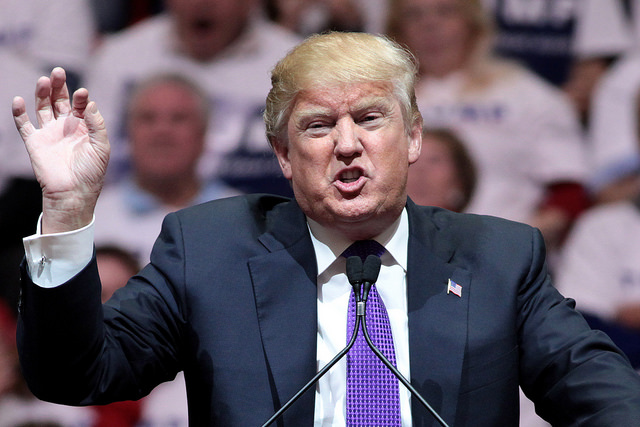The president-elect is a poor role model for young people. But to address the causes of bullying, we must go deeper.

Notorious for his inflammatory remarks, is Donald Trump the bully-in-chief? Photo credit: Gage Skidmore
The timing couldn't have been better. A US election you could mistake for pantomime, with two distinct, polarising and sometimes comical characters. Halloween, a night of uncanny resemblance and painstakingly-crafted costumes.
The result? A video of two young trick-or-treaters effortlessly imitating the presidential candidates, Donald Trump and Hillary Clinton.
To some, imitation of Trump has not been such a laughing matter. A number of American schools have voiced concern that a ‘Trump effect’ has contributed to a rise in bullying and inappropriate behaviour.
But is America’s president-elect, notorious for his racist, misogynistic and otherwise inappropriate remarks, also responsible for inspiring bullies? The answer may not be so obvious.
According to YoungMinds, ‘around 70 per cent of young people have been bullied at one time and one million children are bullied every week’. In schools across the country, it's a growing problem that requires concerted action.
The difficulty for teachers and pastoral leads lies in developing a whole-school approach to bullying, while at the same time remaining sensitive to particular incidents that may arise for any one of a thousand different reasons.
It's commonly said that bullies have often been victims of bullying themselves, and the root causes are typically emotional. But that's not to say that bullies, the youngest in particular, won't be influenced by what they hear their parents say, what impressions they get from the news and so on.
However, the idea of a ‘Trump effect’ can be easily exaggerated. Negative behaviour has been reinforced by negative role models long before ‘the Donald’ appeared on the scene. What’s often missing in schools where bullying is common is a robust effort to nurture the self-esteem of all pupils.
Blaming figures like Trump is the equivalent of throwing an effigy on to a fire in an effort to put it out, instead of for a bucket of water
As Clive Stevenson pointed out at our recent Mental Health and Wellbeing conference, it’s ‘the oldest algorithm in the book.’ Give pupils an environment where they can feel understood and valued, and you will increase their self-esteem and encourage more positive emotional engagement.
A crucial part of this is recognising that children who bully those of another faith or ethnic background haven’t necessarily picked up the firmly-held prejudices of their parents, or fallen for the divisive rhetoric of people like Trump. They may simply be confused, or unaware of how to approach cultural differences.
Taking steps to promote diversity and challenge division, through lesson activities or 'buddy systems', can help reduce prejudice-based bullying. This can only happen if staff have the confidence not only to identify and deal with incidents as they emerge, but to teach diversity across the curriculum and work with parents.
Anti-Bullying Week is a great initiative, not least because it shows how much difference pupils can make, and have made, in supporting one another. It's important we take the time to recognise those who make outstanding contributions to the wellbeing of their classmates, their schools and their communities.
Schools can benefit greatly not only from having anti-bullying ambassadors but also rewarding them for their work. A 2011 report by Goldsmith's College into the effectiveness of various anti-bullying strategies found that peer-to-peer support systems have worked exceptionally well; particularly for pupils at transition or new to the school.
Donald Trump is unlikely to be an anti-bullying ambassador, on that we can all agree. However, blaming him for a rise in bullying would be equivalent to throwing an effigy on to a fire in an effort to put it out, instead of reaching for a bucket of water.
All in all, schools have a responsibility to model positive, appropriate behaviour; focusing on what unites pupils, and giving them the chance to talk. Negative behaviour always has deeper root causes, and teachers need to be the compassionate detective.
Leave Trump, and others like him, out of the equation. If there have to be role models, let it be the heroes, not the loudmouths, who take centre stage.